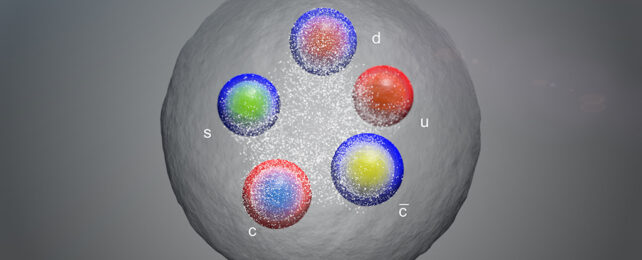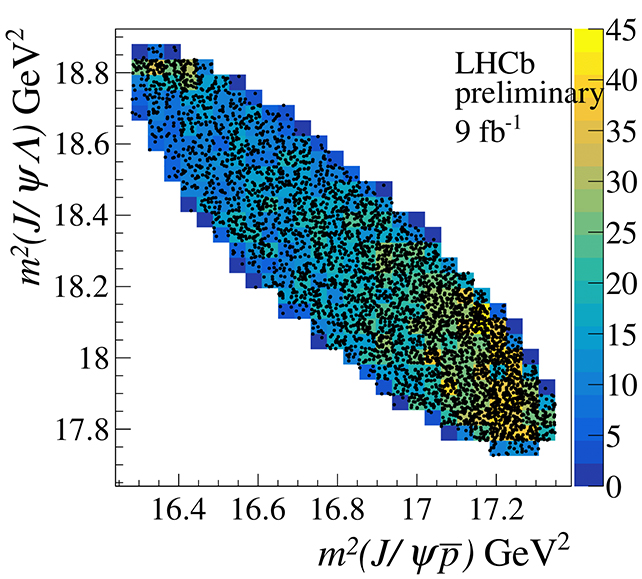Scientists Discover There's Something Unexpected About This Newly Detected Pentaquark
Physics15 July 2023
By David Nield

An illustrative representation of the new pentaquark. (Large Hadron Collider beauty experiment)
Scientists at the Large Hadron Collider (LHC) continue to discover exotic particles that we've never seen before. The latest to be spotted in experiments is the first pentaquark to contain a strange quark.
If you're new to quarks, they're the subatomic building blocks that make up matter, and the strange quark is one of six different types: up, down, top, bottom, charm, and strange. You'll predominantly find three quarks in both protons and neutrons, for example.
Back in 2015, experiments at the LHC confirmed the existence of pentaquarks, or four quarks and one antiquark bound together. That was some 50 years after scientists had first started theorizing their existence.
Further research published in 2019 revealed the underlying structure of pentaquarks: As had been suspected, they are made up of a meson (a quark and antiquark pair) and a baryon (a set of three quarks).
Now the LHC team has come across a new pentaquark combination. It contains one charm quark, an up quark, a down quark, and a strange quark, plus a charm antiquark (the antimatter, opposite charge equivalent of a charm quark).
Some very complex calculations are required to spot these new particles, once the LHC has driven the high-speed collision processes. Algorithms sort through the scattering debris to look for any patterns that may represent new particles.
The decay of these particles, the constituent parts that it breaks down into, are then analyzed to see if we are indeed dealing with something completely new – and various statistical significance thresholds need to be met.

A distribution analysis was used to spot the pentaquark. (Large Hadron Collider beauty experiment)
The LHC has been used to discover dozens of exotic particles like this, so-called because they go beyond the two-quark and three-quark structures. They help scientists understand the foundational building blocks of existence and how these blocks interact with each other.
In particular, researchers are keen to push past the Standard Model of physics in an attempt to explain some of the anomalies in it that still exist. It doesn't really account for dark matter, for example, which suggests that there are fundamentals out there that we have yet to observe and discover.
The 27-kilometer (17-mile) LHC continues to improve in terms of its power and efficiency, and we can expect plenty more breakthroughs to emerge in the future, too – perhaps even eclipsing the discovery of the Higgs boson in 2012.
The research was originally announced at ICHEP 2022 International Conference on High Energy Physics in Italy and is due to be published in Physical Review Letters.
THANKS TO: https://www.sciencealert.com/scientists-discover-theres-something-unexpected-about-this-newly-detected-pentaquark
Physics15 July 2023
By David Nield

An illustrative representation of the new pentaquark. (Large Hadron Collider beauty experiment)
Scientists at the Large Hadron Collider (LHC) continue to discover exotic particles that we've never seen before. The latest to be spotted in experiments is the first pentaquark to contain a strange quark.
If you're new to quarks, they're the subatomic building blocks that make up matter, and the strange quark is one of six different types: up, down, top, bottom, charm, and strange. You'll predominantly find three quarks in both protons and neutrons, for example.
Back in 2015, experiments at the LHC confirmed the existence of pentaquarks, or four quarks and one antiquark bound together. That was some 50 years after scientists had first started theorizing their existence.
Further research published in 2019 revealed the underlying structure of pentaquarks: As had been suspected, they are made up of a meson (a quark and antiquark pair) and a baryon (a set of three quarks).
Now the LHC team has come across a new pentaquark combination. It contains one charm quark, an up quark, a down quark, and a strange quark, plus a charm antiquark (the antimatter, opposite charge equivalent of a charm quark).
Some very complex calculations are required to spot these new particles, once the LHC has driven the high-speed collision processes. Algorithms sort through the scattering debris to look for any patterns that may represent new particles.
The decay of these particles, the constituent parts that it breaks down into, are then analyzed to see if we are indeed dealing with something completely new – and various statistical significance thresholds need to be met.

A distribution analysis was used to spot the pentaquark. (Large Hadron Collider beauty experiment)
The LHC has been used to discover dozens of exotic particles like this, so-called because they go beyond the two-quark and three-quark structures. They help scientists understand the foundational building blocks of existence and how these blocks interact with each other.
In particular, researchers are keen to push past the Standard Model of physics in an attempt to explain some of the anomalies in it that still exist. It doesn't really account for dark matter, for example, which suggests that there are fundamentals out there that we have yet to observe and discover.
The 27-kilometer (17-mile) LHC continues to improve in terms of its power and efficiency, and we can expect plenty more breakthroughs to emerge in the future, too – perhaps even eclipsing the discovery of the Higgs boson in 2012.
The research was originally announced at ICHEP 2022 International Conference on High Energy Physics in Italy and is due to be published in Physical Review Letters.
THANKS TO: https://www.sciencealert.com/scientists-discover-theres-something-unexpected-about-this-newly-detected-pentaquark






 Sat Mar 23, 2024 11:33 pm by globalturbo
Sat Mar 23, 2024 11:33 pm by globalturbo

